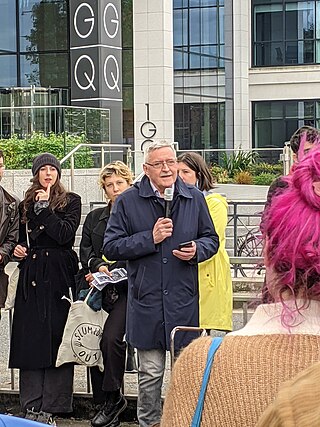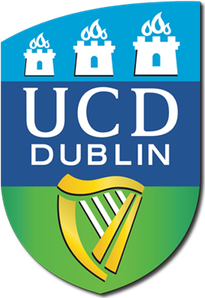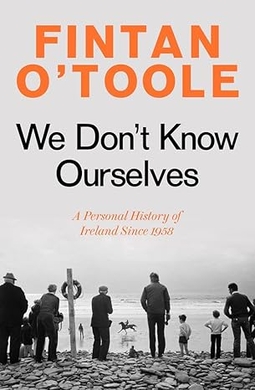
The Irish Times is an Irish daily broadsheet newspaper and online digital publication. It was launched on 29 March 1859. The editor is Ruadhán Mac Cormaic. It is published every day except Sundays. The Irish Times is Ireland's leading newspaper. It is considered a newspaper of record for Ireland.

Paul Muldoon is an Irish poet.
Geraldine Kennedy is an Irish journalist and politician who served as the first female editor of The Irish Times newspaper. She previously served as a Teachta Dála (TD) for the Dún Laoghaire constituency from 1987 to 1989.
Conor Brady is an Irish journalist, novelist and academic. He was the editor of The Irish Times between 1986 and 2002.

Hugh Leonard was an Irish dramatist, television writer, and essayist. In a career that spanned 50 years, Leonard wrote nearly 30 full-length plays, 10 one-act plays, three volumes of essay, two autobiographies, three novels, numerous screenplays and teleplays, and a regular newspaper column.

Colm Tóibín is an Irish novelist, short story writer, essayist, journalist, critic, playwright and poet.
Anthony Gerard Richard Cronin was an Irish poet, arts activist, biographer, commentator, critic, editor and barrister.
Declan Kiberd is an Irish writer and scholar with an interest in modern Irish literature, both in the English and Irish languages, which he often approaches through the lens of postcolonial theory. He is also interested in the academic study of children's literature. He serves on the advisory board of the International Review of Irish Culture and is a professor at the University of Notre Dame and at its campus in Dublin. In recent years and with publications such as After Ireland (2018), Kiberd has become a commentator on contemporary Irish social and political issues, particularly as such issues have been examined by Ireland's writers.
Robert Fitzroy 'Roy' Foster, publishing as R. F. Foster, is an Irish historian and academic. He was the Carroll Professor of Irish History from 1991 until 2016 at Hertford College, Oxford.

Frank McDonald is an author, journalist, environmentalist and former environment editor of The Irish Times.
Bruce Arnold was an English journalist and author who lived in Ireland from 1957. His main expertise was in the fields of literary criticism and art criticism.

University College Dublin is a public research university in Dublin, Ireland, and a member institution of the National University of Ireland. With 38,417 students, it is Ireland's largest university, and amongst the most prestigious universities in Europe. Five Nobel Laureates are among UCD's alumni and current and former staff. Additionally, four Taoisigh and three Irish Presidents have graduated from UCD, along with one President of India.
Richard Leslie Beswetherick Pine is the author of critical works on the Irish playwright Brian Friel, the Anglo-Irish novelist Lawrence Durrell, and aspects of art music in Ireland. He worked for the Irish national broadcaster RTÉ Raidió Teilifís Éireann before moving to Greece in 2001 to found the Durrell School of Corfu, which he directed until 2010. From 2009 to 2020 he wrote a regular column on Greek affairs in The Irish Times and was also an obituarist for The Guardian.
Kevin Kiely is a poet, critic, author and playwright whose writings and public statements have met with controversy and also with support.

Shelley McNamara is an Irish architect and academic. She attended University College Dublin and graduated in 1974 with a Bachelor of Architecture. She founded Grafton Architects with Yvonne Farrell in 1978. Grafton rose to prominence in the early 2010s, specialising in stark, weighty but spacious buildings for higher education. McNamara has taught architecture at University College Dublin since 1976 and at several other universities.

Neale Richmond is an Irish Fine Gael politician who has served as Minister of State since 2023. He has been a Teachta Dála (TD) for the Dublin Rathdown constituency since the 2020 general election. He previously served as a Senator for the Labour Panel from 2016 to 2020.

Ian James Marshall is a farmer and former Ulster Unionist Party (UUP) politician from Markethill, County Armagh, in Northern Ireland. He is from a unionist background and campaigned against Brexit. He was elected to Seanad Éireann in Dublin in 2018, but lost his seat in the 2020 Seanad election.
Jane Ohlmeyer,, is a historian and academic, specialising in early modern Irish and British history. She is the Erasmus Smith's Professor of Modern History (1762) at Trinity College Dublin and Chair of the Irish Research Council, which funds frontier research across all disciplines.
Donal O'Kelly is an Irish playwright and actor.

We Don't Know Ourselves: A Personal History of Ireland Since 1958 is a book by Irish journalist and critic Fintan O’Toole published in 2021. The book combines aspects of history, memoir, reporting, political commentary and criticism to present a portrait of Ireland from 1958 to the present day.










